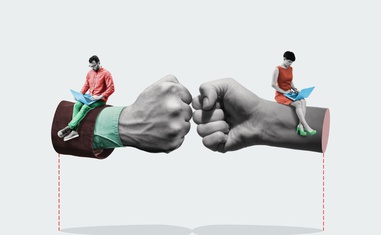The views expressed in our content reflect individual perspectives and do not represent the authoritative views of the Baha'i Faith.
Do you define yourself by your job? Do you work harder, smarter, and longer than others? Do you answer the question “Who are you?” by first telling people what profession you profess?
If so, you might be a workaholic, a victim of “workism,” or perhaps one of those whose career has become their religion.
If you’ve never heard of workism, Wikipedia defines it as “… the belief that employment is not only necessary for economic production but is also the centerpiece of one’s identity and life purpose.”
RELATED: How to Work with Moderation and Pure Intention
If the relatively new word workism seems strange to you, think of it this way: as the Protestant work ethic taken to the extreme; as the real definition of hustle culture; or as the reason for the pejorative label “work martyr.”
Sound familiar?
It sure does to me. I once fit into that category myself, and now I think of the severe limits of a work-related self-definition every time someone I’ve just met asks this common but slightly irritating question, “What do you do?”
A friend of mine likes to answer that question this way: “Well, I’m trying to be the most spiritual person I can in this world so I can get to the next world.”
Defining Ourselves By Our Jobs
Rather than who we really are inside, many people now tend to define themselves by their jobs. It’s as if we can only think of ourselves, in our productivity-focused, materialistic cultures and our all-consuming professional lives and our devotion to the fickle gods of status and achievement, as individuals dominated and solely driven by our work lives.
That’s a shame.
Why? Because we’re real flesh-and-blood human beings, not automatons. We are not defined solely, or even primarily, by our occupations. We’re mothers and fathers, sisters and brothers, actual feeling people first, before (and after) we ever assume any work-related identity.
Most importantly, we’re essentially spiritual beings. We have hearts and souls, a mind, and a conscience. We have distinct personalities and passions. We love one another, and we have a Creator who loves us. As the Baha’i teachings say so emphatically, “Man is, in reality, a spiritual being, and only when he lives in the spirit is he truly happy.”
That passage, from a speech Abdu’l-Baha gave in Paris in 1911, refers to the development of our inner life as our most important occupation. In this subsequent address, which Abdu’l-Baha gave in New York a year later, he again cautioned all people not to solely focus their lives on this material world:
Consider the human world. … Some were mere captives of self and desire, engulfed in the passions of the lower nature. They attained to wealth, to the comforts of life, to fame. And what was the final outcome? Utter evanescence and oblivion. Reflect upon this. Look upon it with the eye of admonition. No trace of them remains, no fruit, no result, no benefit; they have gone utterly—complete effacement.
What Would You Be — and Do — in a Society Where Work Became Worship?
Just imagine this: what if, by some miraculous turn of events in the future, artificial intelligence and robotics managed to supplant and replace much of the human labor we have to do now to survive? What if we only needed a small core of engineers and programmers to help direct the machines that replaced much of our work?
What would you do then?
Well, first, we’d all be out of a job — so let’s say, just hypothetically, that we figured out ways to turn the unceasingly profitable labors of machines into a means for the prosperity for all people.
What if we all, thanks to the societal wealth that could arise from AI and robotics and all of their tireless and unstinting productivity, received a universal basic income (which some economists are already proposing, and some countries have already begun implementing) that would take care of our core material needs? What if our housing and transportation and health care and food needs were met by that machine-generated prosperity? What if our vocations were more closely related to our avocations? What if our work lives became more spiritual so that our work could truly become worship?
What if, at some point in the future, machines really did take over, and freed us from the unstinting drudgery of labor and the cruel demands of survival of the fittest?
This isn’t that far-fetched anymore, by the way — many futurists are already predicting that the world could begin to achieve such a thing before too long. The Baha’i teachings anticipated this future state of human affairs as far back as the early 20th century, as this accounting of her 1907 interview with Abdu’l-Baha from Mary Hanford Ford so clearly shows:
Of all these hours spent with Abdu’l-Baha however, the most memorable and eloquent were those in which He described the economic future of mankind. At that period, in 1907 the labour saving machines had not yet affected the labour market to a serious extent, nor produced what must be generally recognized as a high degree of permanent unemployment but the change was working and Abdu’l-Baha well understood its righteous conclusion. …
He said: “Today the dynamic energy of the Holy Spirit has poured in such volume through the Messenger of God that even the masses of men have received it, and that was not possible before. Always in the past specially sensitized souls received the influence and acted upon it. But today for the first time the minds of all people have been touched by the spirit, and the result is that the designs of labour saving machines have been clearly revealed to them. It may seem strange to you that the Holy Spirit should give designs for labour saving machines,” he added, “but in reality every creative impulse of the brain can arise only through contact with the spirit. Without that the brain is merely capable of conventional and traditional action.
“The civilizations of the past have all been founded upon the enslavement of mankind and the poor working class has suffered every oppression for the sake of the enrichment of the few. This limited wealthy class has alone had the privilege of developing individuality. The down trodden worker after labouring long hours each day, has not had sufficient mental capacity at the conclusion of his task to do anything but eat and sleep.
“That all mankind might have opportunity, it was necessary to shorten the hours of labour so that the work of the world could be completed without such demand of strain and effort, and all human beings would have leisure to think and develop individual capacity.
“The labour saving machines were given to create leisure for all mankind.” Abdu’l-Bahá repeated this several times. He was so deeply impressed with this fact that as He spoke He arose and walked back and forth in the little room, His face and eyes shining with joy over the happy future into which He gazed.
“The first decided shortening of the hours will appear,” He declared, “when a legal working day of eight hours is established,” and this, of course, took place [a decade later] in 1917 when Woodrow Wilson enacted the legal day of eight hours for all federal workers, and really for the workers of the United States.
“But this working day of eight hours is only the beginning,” went on Abdu’l-Baha. “Soon there will be a six hour day, a five hour, a three hour day, even less than that, and the worker must be paid more for this management of machines, than he ever received for the exercise of his two hands alone.”
Speaking in 1907, Abdu’l-Baha said, “You cannot understand now, how the labour saving machines can produce leisure for mankind because at present they are all in the hands of the financiers and are used only to increase profits, but that will not continue. The workers will come into their due benefit from the machine that is the divine intention, and one cannot continue to violate the law of God. So with the assurance of a comfortable income from his work, and ample leisure for each one, poverty will be banished and each community will create comfort and opportunity for its citizens. Education will then be universal at the cost of the state, and no person will be deprived of its opportunity.”
That prescient interview, reprinted in the July, 1933 edition of the Baha’i magazine “Star of the West,” can give us a glimpse of a potential future, when our labors can increasingly contribute to the good of humanity as a whole.

















Comments
Sign in or create an account
Continue with Facebookor